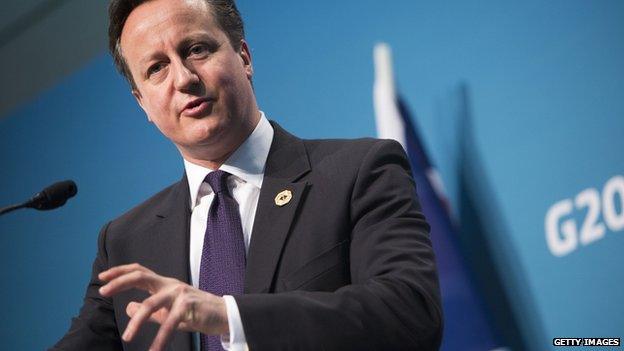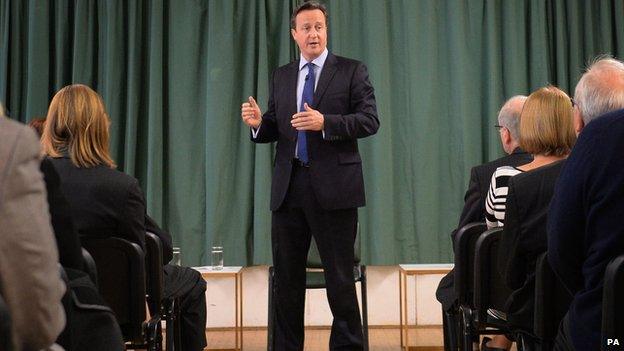David Cameron gets his excuses in early
- Published

David Cameron calls it "pitch rolling" - preparing the ground for a big match.
The prime minister has just got his heaviest roller out to prepare for not one but two huge political matches - Thursday's Rochester by-election and the Autumn Statement in less than three weeks' time.
He expects the Tories to lose the by-election - despite having boasted of throwing the kitchen sink to stop the Conservative defector Mark Reckless getting, and I do quote the PM here, "his fat arse back onto the green benches" of the Commons. That could lead other Tory MPs to contemplate defecting too.
After some difficult political news will come some testing economic news when the chancellor has to explain away official economic forecasts that look set to show that despite recent good economic news - higher growth, lower unemployment and, at last, an increase in real wages - government borrowing may well go up.
That's the backdrop to Mr Cameron's article in the Guardian, external which warns that "red warning lights are once again flashing on the dashboard of the global economy". He lists the following looming problems:
"The eurozone is teetering on the brink of a possible third recession"
"Emerging market economies which were the driver of growth in the early stages of the recovery are now slowing down"
"Global trade talks have stalled"
"The epidemic of Ebola, conflict in the Middle East and Russia's illegal actions in Ukraine are all adding a dangerous backdrop of instability and uncertainty"
All these, he concludes, "pose a real risk to our recovery at home".
The prime minister is getting his excuses in early. Halfway through this financial year the government was shown to have borrowed a cumulative £58bn - that's more than £5 billion more than at the same point last year - even though borrowing is supposed to be falling.

The PM expects the Tories to lose the Rochester by-election, despite intense campaigning
The Chief Secretary to the Treasury Danny Alexander told the cabinet last week that that he might have to impose new spending curbs in the Autumn Statement.
The reason is that tax revenues are not recovering as quickly as the economy. The chairman of the Office for Budget Responsibility, Robert Chote, recently told the BBC: "We've been getting fewer pence of revenue coming in for every pound of wages and salaries that's generated. From the perspective of the public finances that's not particularly good news."
So, what is the prime minister's conclusion?
He writes in the Guardian: "As the global economy faces greater uncertainty it is more important than ever that we send a clear message to the world that Britain is not going to waver on dealing with its debts.
"In six months' time Britain will face a choice. The long-term plan that has seen Britain prosper, or the easy answers that would surely have seen it fail."
In other words his message to the country and his party is that even if things get worse, perhaps especially if things get worse, the right answer is - you've guessed it - to stick to his plan.